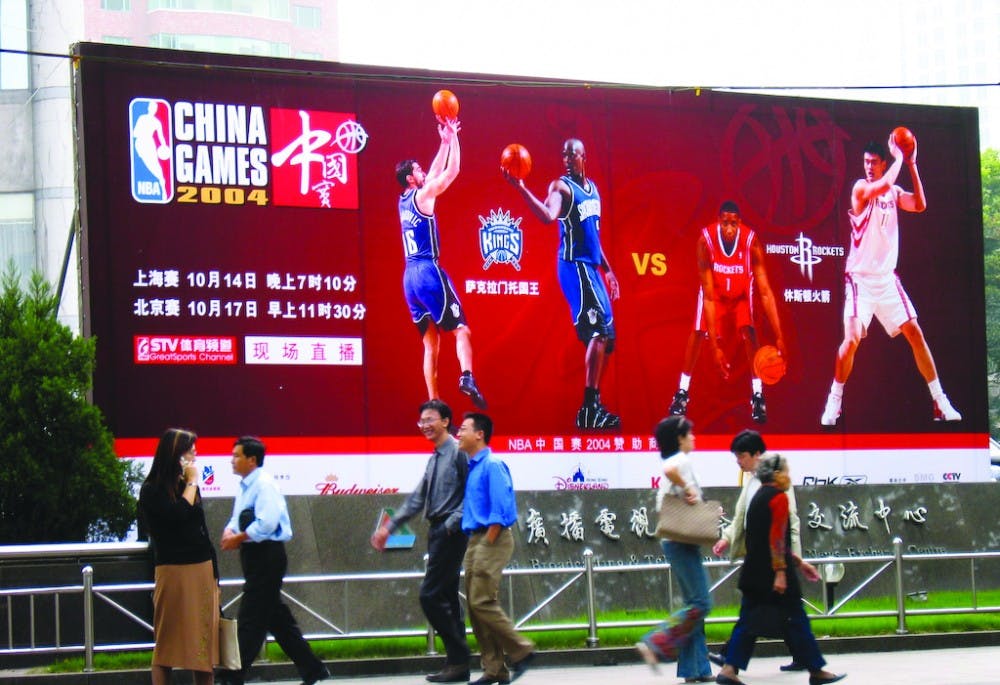
The date is Oct. 4, 2019. The NBA season is only weeks away from starting. All is going seemingly well for the Houston Rockets. Most Valuable Player James Harden is back for what should be another strong season, and he is joined by former teammate and previous MVP Russell Westbrook, as well as returning role players such as Clint Capela and P.J. Tucker.
On this fateful day, however, Rockets General Manager Daryl Morey posted a tweet in response to the protests happening on the other side of the globe in Hong Kong. His tweet was a simple photo that read, “Fight for Freedom. Stand with Hong Kong.”
Yet the response this simple tweet generated has been anything but simple.
To be able to grasp the gravity of Morey’s tweet, it is necessary to understand what is going on in Hong Kong. Hong Kong has been in the midst of protests for about six and a half months. What started as a protest against the Fugitive Offenders bill that would allow Hong Kong authorities to extradite wanted criminals to mainland China or Taiwan, has now come to embody a much bigger issue.
From my understanding, the situation in Hong Kong reflects the battle between free speech and censorship, between basic human rights and an authoritarian government. Of course, having grown up in America, a bastion of free speech, I will have to acknowledge my own bias in interpreting and explaining the NBA-China controversy. But how the entire situation has been handled — from the Rockets organization’s attempt to salvage things with China to the NBA’s own contradictory actions — has been quite shameful.
The Rockets organization and the NBA went in full damage control mode following Morey’s tweet. Morey quickly deleted his tweet in response to the backlash and tweeted an apology. He has been silent on Twitter since then. Rockets owner Tilman Fertitta tweeted in condemnation of Morey’s action, emphasizing that the Rockets are not a political organization.
The NBA issued an official statement apologizing to Chinese fans, reinforcing how much the league values their support. It is important to note the underlying factors behind this veil of apologies.
Chinese sponsors and broadcasting stations immediately cut ties with the Rockets, which could potentially lose them millions of dollars. The NBA, through sponsorship and broadcasting deals, makes about half a billion dollars in revenue a year with China, so it makes sense that the NBA is doing all that it can to preserve this relationship.
The reality is that the NBA is a business, and thus will do all that it can to maximize and sustain profits. Nonetheless, all of these apologies come off as somewhat hypocritical coming from a league like the NBA, the supposed trailblazer in all sports when dealing with political issues.
Consider how commissioner Adam Silver openly voiced his support last year for Turkish forward Enes Kanter, who faced political persecution from the Turkish government. After voicing his discontent with current Turkish President Recep Tayyip Erdogan, Kanter has not been able to go back to his home country — where all of his family still reside — because of his current arrest warrant. Silver backed Kanter acknowledged that “[for] the NBA, as a global business, we have to pay attention to these [human rights] issues as well.”
Similarly, look at how Silver banned Clippers owner Donald Sterling from the NBA for life, and rightfully so, over his openly racist behavior in 2014. A leaked phone conversation between Sterling and his mistress revealed how Sterling did not want his mistress to “associate with black people.” Silver expressed how Sterling’s racist views were “deeply disturbing and alarming,” and issued Sterling’s banishment, a move that was seen as bold for a commissioner in his first year.
So how is it that in these situations, the NBA is ready to address humanitarian and racial issues? Why is it now, when millions of dollars are on the line, that the NBA backpedals and submits to the other side?
The events that have unfolded since Morey’s tweet show how the NBA is still ultimately subject to the almighty dollar, but perhaps there is value in looking at this situation from another perspective.
We must acknowledge that, as Americans, we are wired so that our guttural reaction to this situation is to call out the hypocrisy displayed by the NBA and all parties involved. We grew up with the First Amendment and the Bill of Rights, all stressing the importance of free expression and the protection of basic rights, but the Chinese people have grown up in a different reality.
Living with strict censorship of mass media, many Chinese people are forced to base their political opinions off of the notion that their government is working for the best interests of the people.
Some Chinese people feel indebted to their government, believing that its leaders, starting from Mao Zedong to Xi Jinping, have lifted the working peasant classes from the depths of poverty. Just as we Americans would not want to live in a society without the Constitution, so too would some Chinese people resent a society without communism.
It is perhaps understandable then why many Chinese businesses object to the U.S. outcries surrounding the issues about Hong Kong. How would it look to the Chinese people if its business partner criticized its government when all is well in their opinion?
Furthermore, as a global business, maybe the NBA has a responsibility to maintain good relations with all foreign nations, especially in a market as large as China’s. Yet still, I stand by the belief that this situation goes beyond the relationship between the NBA and China. It goes beyond basketball and beyond even just these two parties.
The decision for the NBA to try to salvage relations with China instead of standing behind Daryl Morey and Hong Kong reflects that it is money that is the ultimate motivator for the NBA. When the NBA decides to side with China, any and all future political moves from the league will come off as disingenuous and just another PR stunt.
The NBA should either accept its role and be that trailblazer when dealing with political issues, even at the loss of profits, or sit down and stop pretending to be one.





